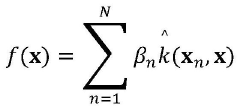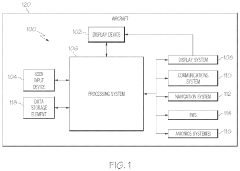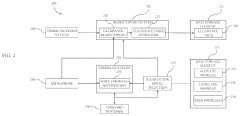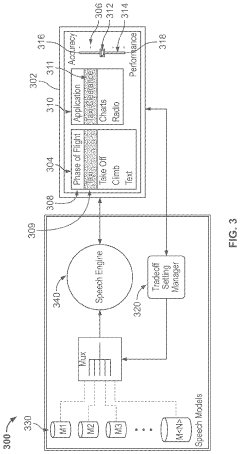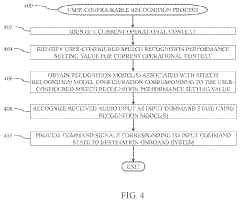Quantum Computing Techniques for Enhanced Speech Recognition Systems
JUL 17, 20259 MIN READ
Generate Your Research Report Instantly with AI Agent
Patsnap Eureka helps you evaluate technical feasibility & market potential.
Quantum Speech Recognition Evolution and Objectives
Quantum computing has emerged as a revolutionary technology with the potential to transform various fields, including speech recognition systems. The evolution of quantum speech recognition techniques has been driven by the need for more accurate, efficient, and scalable solutions to address the limitations of classical computing approaches.
The field of quantum speech recognition has its roots in the early 2000s when researchers began exploring the potential applications of quantum computing in natural language processing. Initially, the focus was on theoretical frameworks and proof-of-concept experiments. As quantum hardware capabilities improved, more practical implementations became feasible, leading to a surge in research and development efforts.
The primary objective of quantum speech recognition is to leverage the unique properties of quantum systems, such as superposition and entanglement, to enhance the performance of speech recognition algorithms. This includes improving accuracy, reducing computational complexity, and enabling real-time processing of large-scale speech data.
One of the key milestones in the evolution of quantum speech recognition was the development of quantum-inspired algorithms that could be implemented on classical computers. These algorithms paved the way for hybrid approaches that combine classical and quantum computing techniques, allowing researchers to explore quantum advantages without the need for fully-fledged quantum hardware.
As quantum hardware continues to advance, researchers are now focusing on developing native quantum algorithms for speech recognition tasks. These algorithms aim to exploit the full potential of quantum systems, addressing challenges such as noise reduction, feature extraction, and language modeling in ways that are fundamentally different from classical approaches.
The objectives of quantum speech recognition research extend beyond mere performance improvements. They include developing more energy-efficient solutions, enabling multilingual and cross-lingual speech recognition, and creating adaptive systems that can learn and improve in real-time. Additionally, there is a growing interest in integrating quantum speech recognition with other quantum-enhanced technologies, such as quantum machine learning and quantum natural language processing, to create more comprehensive and powerful AI systems.
Looking ahead, the field of quantum speech recognition is poised for significant advancements. As quantum hardware becomes more accessible and reliable, researchers anticipate breakthroughs in areas such as quantum error correction, quantum feature mapping, and quantum-enhanced acoustic modeling. These developments are expected to lead to speech recognition systems that can handle increasingly complex and diverse speech patterns with unprecedented accuracy and efficiency.
The field of quantum speech recognition has its roots in the early 2000s when researchers began exploring the potential applications of quantum computing in natural language processing. Initially, the focus was on theoretical frameworks and proof-of-concept experiments. As quantum hardware capabilities improved, more practical implementations became feasible, leading to a surge in research and development efforts.
The primary objective of quantum speech recognition is to leverage the unique properties of quantum systems, such as superposition and entanglement, to enhance the performance of speech recognition algorithms. This includes improving accuracy, reducing computational complexity, and enabling real-time processing of large-scale speech data.
One of the key milestones in the evolution of quantum speech recognition was the development of quantum-inspired algorithms that could be implemented on classical computers. These algorithms paved the way for hybrid approaches that combine classical and quantum computing techniques, allowing researchers to explore quantum advantages without the need for fully-fledged quantum hardware.
As quantum hardware continues to advance, researchers are now focusing on developing native quantum algorithms for speech recognition tasks. These algorithms aim to exploit the full potential of quantum systems, addressing challenges such as noise reduction, feature extraction, and language modeling in ways that are fundamentally different from classical approaches.
The objectives of quantum speech recognition research extend beyond mere performance improvements. They include developing more energy-efficient solutions, enabling multilingual and cross-lingual speech recognition, and creating adaptive systems that can learn and improve in real-time. Additionally, there is a growing interest in integrating quantum speech recognition with other quantum-enhanced technologies, such as quantum machine learning and quantum natural language processing, to create more comprehensive and powerful AI systems.
Looking ahead, the field of quantum speech recognition is poised for significant advancements. As quantum hardware becomes more accessible and reliable, researchers anticipate breakthroughs in areas such as quantum error correction, quantum feature mapping, and quantum-enhanced acoustic modeling. These developments are expected to lead to speech recognition systems that can handle increasingly complex and diverse speech patterns with unprecedented accuracy and efficiency.
Market Analysis for Quantum-Enhanced Speech Recognition
The market for quantum-enhanced speech recognition systems is poised for significant growth, driven by the increasing demand for more accurate and efficient voice-based technologies across various industries. As quantum computing continues to advance, its potential to revolutionize speech recognition algorithms has caught the attention of both tech giants and startups alike.
The global speech and voice recognition market, currently valued at approximately $10 billion, is expected to experience substantial expansion with the integration of quantum computing techniques. Industry analysts project a compound annual growth rate (CAGR) of around 20% over the next five years, potentially pushing the market value to over $25 billion by 2028.
Key sectors driving this growth include automotive, healthcare, consumer electronics, and enterprise solutions. In the automotive industry, quantum-enhanced speech recognition is anticipated to improve voice-controlled navigation systems and in-car assistants, enhancing driver safety and user experience. The healthcare sector is exploring applications in medical transcription and voice-based diagnostic tools, which could significantly streamline clinical workflows and improve patient care.
Consumer electronics manufacturers are particularly interested in quantum-enhanced speech recognition for smart home devices, wearables, and smartphones. The promise of near-perfect accuracy in noisy environments and multilingual capabilities is expected to drive consumer adoption and open new market opportunities.
Geographically, North America currently leads the market due to its strong technological infrastructure and early adoption of quantum computing research. However, Asia-Pacific is expected to witness the fastest growth, fueled by rapid digitalization in countries like China, Japan, and South Korea.
The competitive landscape is characterized by a mix of established tech companies and quantum computing startups. Major players like IBM, Google, and Microsoft are investing heavily in quantum-enhanced AI technologies, including speech recognition. Meanwhile, specialized quantum startups are forming strategic partnerships with speech recognition companies to develop cutting-edge solutions.
Despite the promising outlook, the market faces challenges such as the high cost of quantum computing infrastructure and the need for specialized expertise. Additionally, concerns about data privacy and security in quantum systems may impact adoption rates in sensitive industries.
In conclusion, the market for quantum-enhanced speech recognition systems shows tremendous potential for growth and innovation. As quantum computing technology matures and becomes more accessible, we can expect to see a wave of new applications and services that leverage quantum techniques to push the boundaries of speech recognition capabilities.
The global speech and voice recognition market, currently valued at approximately $10 billion, is expected to experience substantial expansion with the integration of quantum computing techniques. Industry analysts project a compound annual growth rate (CAGR) of around 20% over the next five years, potentially pushing the market value to over $25 billion by 2028.
Key sectors driving this growth include automotive, healthcare, consumer electronics, and enterprise solutions. In the automotive industry, quantum-enhanced speech recognition is anticipated to improve voice-controlled navigation systems and in-car assistants, enhancing driver safety and user experience. The healthcare sector is exploring applications in medical transcription and voice-based diagnostic tools, which could significantly streamline clinical workflows and improve patient care.
Consumer electronics manufacturers are particularly interested in quantum-enhanced speech recognition for smart home devices, wearables, and smartphones. The promise of near-perfect accuracy in noisy environments and multilingual capabilities is expected to drive consumer adoption and open new market opportunities.
Geographically, North America currently leads the market due to its strong technological infrastructure and early adoption of quantum computing research. However, Asia-Pacific is expected to witness the fastest growth, fueled by rapid digitalization in countries like China, Japan, and South Korea.
The competitive landscape is characterized by a mix of established tech companies and quantum computing startups. Major players like IBM, Google, and Microsoft are investing heavily in quantum-enhanced AI technologies, including speech recognition. Meanwhile, specialized quantum startups are forming strategic partnerships with speech recognition companies to develop cutting-edge solutions.
Despite the promising outlook, the market faces challenges such as the high cost of quantum computing infrastructure and the need for specialized expertise. Additionally, concerns about data privacy and security in quantum systems may impact adoption rates in sensitive industries.
In conclusion, the market for quantum-enhanced speech recognition systems shows tremendous potential for growth and innovation. As quantum computing technology matures and becomes more accessible, we can expect to see a wave of new applications and services that leverage quantum techniques to push the boundaries of speech recognition capabilities.
Quantum Computing in Speech Recognition: Current State and Challenges
Quantum computing has emerged as a promising technology with the potential to revolutionize various fields, including speech recognition systems. The current state of quantum computing in speech recognition is characterized by both significant advancements and notable challenges. While traditional speech recognition systems have made substantial progress over the years, they still face limitations in handling complex acoustic environments and large-scale language models.
Quantum computing techniques offer unique advantages that could address these limitations. One of the key areas where quantum computing shows promise is in the processing of high-dimensional data, which is inherent in speech recognition tasks. Quantum algorithms, such as quantum principal component analysis and quantum support vector machines, have demonstrated the potential to efficiently handle large datasets and complex feature spaces associated with speech signals.
However, the practical implementation of quantum computing in speech recognition systems faces several challenges. The most significant obstacle is the current limitations of quantum hardware. Existing quantum computers are still in their early stages, with limited qubit counts and high error rates. This restricts the scale and complexity of quantum algorithms that can be effectively implemented for speech recognition tasks.
Another challenge lies in the development of quantum-classical hybrid algorithms that can leverage the strengths of both quantum and classical computing paradigms. These hybrid approaches are crucial for bridging the gap between theoretical quantum advantages and practical applications in speech recognition.
Despite these challenges, research in quantum computing for speech recognition continues to progress. Recent studies have explored quantum-inspired algorithms that can be run on classical computers, providing insights into potential quantum advantages without requiring full-scale quantum hardware. These algorithms have shown promising results in tasks such as phoneme classification and speech feature extraction.
The integration of quantum machine learning techniques with traditional speech recognition models is another area of active research. Quantum-enhanced neural networks and quantum-inspired optimization algorithms are being investigated for their potential to improve the accuracy and efficiency of speech recognition systems.
As quantum hardware continues to advance, it is expected that more sophisticated quantum algorithms for speech recognition will become feasible. This includes the development of quantum error correction techniques and the scaling up of quantum processors, which will enable the implementation of more complex quantum circuits for speech processing tasks.
Quantum computing techniques offer unique advantages that could address these limitations. One of the key areas where quantum computing shows promise is in the processing of high-dimensional data, which is inherent in speech recognition tasks. Quantum algorithms, such as quantum principal component analysis and quantum support vector machines, have demonstrated the potential to efficiently handle large datasets and complex feature spaces associated with speech signals.
However, the practical implementation of quantum computing in speech recognition systems faces several challenges. The most significant obstacle is the current limitations of quantum hardware. Existing quantum computers are still in their early stages, with limited qubit counts and high error rates. This restricts the scale and complexity of quantum algorithms that can be effectively implemented for speech recognition tasks.
Another challenge lies in the development of quantum-classical hybrid algorithms that can leverage the strengths of both quantum and classical computing paradigms. These hybrid approaches are crucial for bridging the gap between theoretical quantum advantages and practical applications in speech recognition.
Despite these challenges, research in quantum computing for speech recognition continues to progress. Recent studies have explored quantum-inspired algorithms that can be run on classical computers, providing insights into potential quantum advantages without requiring full-scale quantum hardware. These algorithms have shown promising results in tasks such as phoneme classification and speech feature extraction.
The integration of quantum machine learning techniques with traditional speech recognition models is another area of active research. Quantum-enhanced neural networks and quantum-inspired optimization algorithms are being investigated for their potential to improve the accuracy and efficiency of speech recognition systems.
As quantum hardware continues to advance, it is expected that more sophisticated quantum algorithms for speech recognition will become feasible. This includes the development of quantum error correction techniques and the scaling up of quantum processors, which will enable the implementation of more complex quantum circuits for speech processing tasks.
Quantum Algorithms for Speech Processing
01 Quantum-inspired algorithms for speech recognition
Quantum-inspired algorithms are being applied to speech recognition tasks to improve accuracy and efficiency. These algorithms leverage quantum computing principles to process and analyze speech data, potentially offering advantages over classical methods in terms of speed and pattern recognition capabilities.- Quantum-inspired algorithms for speech recognition: Quantum-inspired algorithms are being applied to speech recognition tasks to improve accuracy and efficiency. These algorithms leverage quantum computing principles to process and analyze speech data, potentially offering advantages over classical methods in terms of speed and pattern recognition capabilities.
- Quantum neural networks for speech processing: Quantum neural networks are being developed and implemented for speech processing tasks. These networks utilize quantum principles to enhance the learning and recognition capabilities of traditional neural networks, potentially leading to more accurate and efficient speech recognition systems.
- Quantum error correction in speech recognition systems: Quantum error correction techniques are being integrated into speech recognition systems to improve their robustness and reliability. These methods help mitigate the effects of noise and errors in quantum computations, leading to more accurate speech recognition results.
- Quantum-enhanced feature extraction for speech recognition: Quantum computing techniques are being applied to enhance feature extraction processes in speech recognition. These methods leverage quantum algorithms to identify and extract relevant features from speech signals more efficiently, potentially improving the overall performance of speech recognition systems.
- Hybrid quantum-classical approaches for speech recognition: Hybrid approaches combining quantum and classical computing techniques are being developed for speech recognition tasks. These methods aim to leverage the strengths of both quantum and classical systems to create more powerful and efficient speech recognition algorithms.
02 Quantum neural networks for speech processing
Quantum neural networks are being developed to enhance speech processing capabilities. These networks utilize quantum principles to create more complex and efficient models for analyzing speech patterns, potentially leading to improved recognition accuracy and reduced computational requirements.Expand Specific Solutions03 Quantum error correction in speech recognition systems
Quantum error correction techniques are being integrated into speech recognition systems to mitigate the effects of noise and improve overall system reliability. These methods help maintain the integrity of quantum states during computation, leading to more accurate and robust speech recognition results.Expand Specific Solutions04 Quantum-enhanced feature extraction for speech analysis
Quantum computing techniques are being applied to enhance feature extraction processes in speech analysis. These methods leverage quantum algorithms to identify and extract relevant features from speech signals more efficiently, potentially improving the accuracy and speed of speech recognition systems.Expand Specific Solutions05 Hybrid quantum-classical approaches for speech recognition
Hybrid approaches combining quantum and classical computing techniques are being explored for speech recognition tasks. These methods aim to leverage the strengths of both quantum and classical systems to create more efficient and accurate speech recognition algorithms, potentially offering advantages in terms of processing speed and recognition accuracy.Expand Specific Solutions
Key Players in Quantum Computing and Speech Recognition
The quantum computing techniques for enhanced speech recognition systems market is in an early growth stage, with significant potential for expansion. The market size is expected to grow rapidly as quantum computing technology matures and finds more applications in speech recognition. Currently, the technology is still in development, with varying levels of maturity among key players. Major tech giants like Microsoft, Google, IBM, and Intel are investing heavily in quantum computing research and development, focusing on its application in speech recognition. Startups like 1QB Information Technologies and Zapata Computing are also making strides in this field. Academic institutions, such as the Chinese Academy of Sciences Institute of Acoustics, are contributing to advancements through research collaborations. As the technology progresses, we can expect increased competition and innovation in this space.
Microsoft Technology Licensing LLC
Technical Solution: Microsoft is exploring quantum-inspired algorithms for speech recognition, leveraging their Azure Quantum platform. They are developing hybrid quantum-classical approaches that combine the strengths of quantum computing with traditional machine learning techniques. Microsoft's research focuses on using quantum algorithms for feature extraction and dimensionality reduction in speech processing[3]. They are also investigating quantum neural networks for speech recognition tasks, which could potentially outperform classical deep learning models in terms of accuracy and computational efficiency[4]. Additionally, Microsoft is working on noise-resilient quantum circuits specifically designed for speech recognition in challenging acoustic environments.
Strengths: Strong integration with cloud infrastructure, allowing for scalable quantum-inspired solutions. Extensive experience in classical speech recognition technologies. Weaknesses: Limited access to physical quantum hardware compared to some competitors.
Google LLC
Technical Solution: Google is advancing quantum computing techniques for speech recognition through its Quantum AI lab. They are developing quantum machine learning algorithms that can potentially enhance the performance of speech recognition systems. Google's approach includes using quantum approximate optimization algorithms (QAOA) for acoustic model training and quantum-inspired tensor network methods for language modeling[5]. They are also exploring quantum error correction techniques to improve the reliability of quantum computations in speech processing tasks. Google's Sycamore quantum processor serves as a testbed for these quantum speech recognition algorithms, demonstrating potential quantum advantage in specific speech-related computational tasks[6].
Strengths: Cutting-edge quantum hardware and extensive expertise in both quantum computing and AI. Large-scale data processing capabilities. Weaknesses: Quantum algorithms for speech recognition are still in early research stages, with limited practical applications currently.
Breakthrough Quantum Techniques in Speech Recognition
Quantum multi-kernel learning method for low-resource voice command recognition
PatentPendingCN118248127A
Innovation
- The quantum multi-core learning method is used to extract the MFCC features of speech, build a quantum multi-core model, use quantum measurement projection to map the features to latent feature embeddings, maximize the inter-class distance in the prototype network, and optimize the latent feature space to improve recognition accuracy.
Dynamic speech recognition methods and systems with user-configurable performance
PatentActiveUS11688390B2
Innovation
- A user-configurable speech recognition system that allows pilots to dynamically adjust the tradeoff between recognition accuracy and latency using a slider interface, selecting from various model configurations based on user-defined performance settings, which can be context-sensitive and specific to flight phases or onboard systems, utilizing combinations of acoustic and language models to optimize performance.
Quantum Hardware Requirements for Speech Recognition
Quantum computing's potential to revolutionize speech recognition systems hinges on the development of specialized quantum hardware. Current quantum processors, while promising, face significant challenges in meeting the specific requirements of speech recognition tasks. The primary hardware components necessary for quantum-enhanced speech recognition include quantum processing units (QPUs) with high qubit counts and long coherence times.
To effectively process complex speech patterns, quantum systems require a minimum of several hundred logical qubits. However, due to the high error rates of current physical qubits, achieving this level of computational power necessitates thousands of physical qubits. Leading quantum hardware providers are working towards scaling up their systems, with roadmaps projecting the availability of processors with over 1,000 qubits in the near future.
Coherence time, the duration a qubit can maintain its quantum state, is another critical factor. Speech recognition algorithms often involve sequential processing of audio data, demanding longer coherence times to complete the necessary quantum operations. Current state-of-the-art systems achieve coherence times in the range of microseconds to milliseconds, but further improvements are needed to handle real-time speech processing tasks effectively.
Quantum error correction techniques are essential to mitigate the effects of decoherence and gate errors. Surface codes and other topological quantum error correction methods show promise in enhancing the reliability of quantum computations for speech recognition. However, implementing these error correction schemes requires additional physical qubits, further emphasizing the need for scalable quantum hardware.
Quantum interconnects play a crucial role in linking multiple quantum processors to create larger, more powerful systems. Photonic quantum interconnects are particularly promising for speech recognition applications, as they can facilitate the transfer of quantum information between different processing units with minimal loss of coherence.
Cryogenic control systems are necessary to maintain the ultra-low temperatures required for most quantum computing hardware. For speech recognition applications, these systems must be capable of supporting large-scale quantum processors while minimizing thermal noise that could interfere with delicate quantum states.
As quantum hardware continues to evolve, hybrid quantum-classical architectures are likely to play a significant role in early implementations of quantum-enhanced speech recognition systems. These hybrid systems leverage the strengths of both quantum and classical computing paradigms, allowing for incremental integration of quantum capabilities into existing speech recognition frameworks.
To effectively process complex speech patterns, quantum systems require a minimum of several hundred logical qubits. However, due to the high error rates of current physical qubits, achieving this level of computational power necessitates thousands of physical qubits. Leading quantum hardware providers are working towards scaling up their systems, with roadmaps projecting the availability of processors with over 1,000 qubits in the near future.
Coherence time, the duration a qubit can maintain its quantum state, is another critical factor. Speech recognition algorithms often involve sequential processing of audio data, demanding longer coherence times to complete the necessary quantum operations. Current state-of-the-art systems achieve coherence times in the range of microseconds to milliseconds, but further improvements are needed to handle real-time speech processing tasks effectively.
Quantum error correction techniques are essential to mitigate the effects of decoherence and gate errors. Surface codes and other topological quantum error correction methods show promise in enhancing the reliability of quantum computations for speech recognition. However, implementing these error correction schemes requires additional physical qubits, further emphasizing the need for scalable quantum hardware.
Quantum interconnects play a crucial role in linking multiple quantum processors to create larger, more powerful systems. Photonic quantum interconnects are particularly promising for speech recognition applications, as they can facilitate the transfer of quantum information between different processing units with minimal loss of coherence.
Cryogenic control systems are necessary to maintain the ultra-low temperatures required for most quantum computing hardware. For speech recognition applications, these systems must be capable of supporting large-scale quantum processors while minimizing thermal noise that could interfere with delicate quantum states.
As quantum hardware continues to evolve, hybrid quantum-classical architectures are likely to play a significant role in early implementations of quantum-enhanced speech recognition systems. These hybrid systems leverage the strengths of both quantum and classical computing paradigms, allowing for incremental integration of quantum capabilities into existing speech recognition frameworks.
Ethical Implications of Quantum-Enhanced Speech Recognition
The integration of quantum computing techniques into speech recognition systems raises significant ethical concerns that warrant careful consideration. As these advanced systems become more powerful and pervasive, they have the potential to impact privacy, security, and social dynamics in profound ways.
One primary ethical concern is the enhanced capability of quantum-powered speech recognition to process and analyze vast amounts of audio data with unprecedented speed and accuracy. This could lead to increased surveillance capabilities, potentially infringing on individual privacy rights. Governments and corporations might be tempted to deploy such systems for mass monitoring, raising questions about the balance between security and personal freedoms.
Another ethical implication relates to data security. Quantum computing's ability to break current encryption methods could compromise the confidentiality of stored voice data. This vulnerability could expose sensitive personal information, leading to identity theft, financial fraud, or other malicious activities. Developing quantum-resistant encryption methods becomes crucial to protect individuals' speech data.
The improved accuracy of quantum-enhanced speech recognition may also exacerbate existing biases in AI systems. If not carefully designed and trained, these systems could perpetuate or amplify discrimination based on accent, dialect, or speech patterns associated with specific demographic groups. Ensuring fairness and inclusivity in the development and deployment of these technologies is essential to prevent the marginalization of certain populations.
Furthermore, the potential for creating highly convincing deepfake audio content using quantum-enhanced speech recognition and synthesis raises concerns about misinformation and manipulation. The ability to generate realistic voice clones could be misused for fraud, political manipulation, or social engineering, undermining trust in digital communications.
The economic implications of quantum-enhanced speech recognition also present ethical challenges. As these systems become more sophisticated, they may displace human workers in industries relying on voice-based interactions, such as customer service or transcription services. Addressing the potential job displacement and ensuring a just transition for affected workers becomes an important ethical consideration.
Lastly, the concentration of quantum computing capabilities in the hands of a few powerful entities raises questions about equitable access to this technology. The potential for a "quantum divide" could exacerbate existing inequalities, with only wealthy nations or large corporations able to harness the full potential of quantum-enhanced speech recognition systems.
One primary ethical concern is the enhanced capability of quantum-powered speech recognition to process and analyze vast amounts of audio data with unprecedented speed and accuracy. This could lead to increased surveillance capabilities, potentially infringing on individual privacy rights. Governments and corporations might be tempted to deploy such systems for mass monitoring, raising questions about the balance between security and personal freedoms.
Another ethical implication relates to data security. Quantum computing's ability to break current encryption methods could compromise the confidentiality of stored voice data. This vulnerability could expose sensitive personal information, leading to identity theft, financial fraud, or other malicious activities. Developing quantum-resistant encryption methods becomes crucial to protect individuals' speech data.
The improved accuracy of quantum-enhanced speech recognition may also exacerbate existing biases in AI systems. If not carefully designed and trained, these systems could perpetuate or amplify discrimination based on accent, dialect, or speech patterns associated with specific demographic groups. Ensuring fairness and inclusivity in the development and deployment of these technologies is essential to prevent the marginalization of certain populations.
Furthermore, the potential for creating highly convincing deepfake audio content using quantum-enhanced speech recognition and synthesis raises concerns about misinformation and manipulation. The ability to generate realistic voice clones could be misused for fraud, political manipulation, or social engineering, undermining trust in digital communications.
The economic implications of quantum-enhanced speech recognition also present ethical challenges. As these systems become more sophisticated, they may displace human workers in industries relying on voice-based interactions, such as customer service or transcription services. Addressing the potential job displacement and ensuring a just transition for affected workers becomes an important ethical consideration.
Lastly, the concentration of quantum computing capabilities in the hands of a few powerful entities raises questions about equitable access to this technology. The potential for a "quantum divide" could exacerbate existing inequalities, with only wealthy nations or large corporations able to harness the full potential of quantum-enhanced speech recognition systems.
Unlock deeper insights with Patsnap Eureka Quick Research — get a full tech report to explore trends and direct your research. Try now!
Generate Your Research Report Instantly with AI Agent
Supercharge your innovation with Patsnap Eureka AI Agent Platform!

